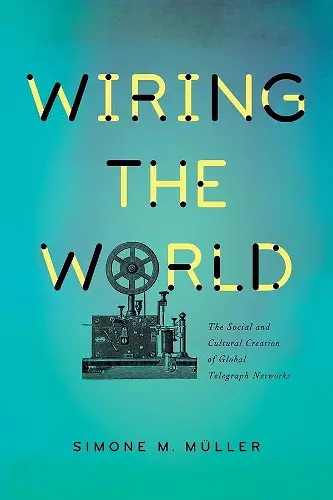Wiring the World
The Social and Cultural Creation of Global Telegraph Networks
Format:Hardback
Publisher:Columbia University Press
Published:10th May '16
Currently unavailable, and unfortunately no date known when it will be back

This unusual history focuses not only on those who advanced transatlantic cable communication, but also on those who harbored alternative ideas. They might seem peripheral, but such struggles determined the growth of cable technology, which in turn influenced world history. Filled with fascinating characters and new insight into defining events, this book recognizes globalization's diverse paths and close ties to business and politics.
Wiring the World is a cultural and social history that explores how the large Anglo-American cable companies won out over alternative visions. Through telegram prices, visions for world peace, scientific innovation, and the role of the nation-state, Simone M. Müller traces globalization's diverse paths and close ties to business and politics.The successful laying of a transatlantic cable in 1866 remade world communications. A message could travel across the ocean in minutes, shrinking the space between continents, cultures, and nations. An eclectic group of engineers, entrepreneurs, politicians, and media visionaries then developed this technology into a telecommunications system that spread a particular vision of civilization-but not everyone wanted to wire the world the same way. Wiring the World is a cultural and social history that explores how the large Anglo-American cable companies won out over alternative visions. Bitter rivalries emerged over telegram prices, visions for world peace, scientific innovation, and the role of the nation-state. Such struggles determined the growth of cable technology, which in turn influenced world history. Filled with fascinating characters and new insights into pivotal events, Wiring the World traces globalization's diverse paths and close ties to business and politics.
Based on a clear knowledge of the state of the art, while adopting a solid methodology and robust concepts, Muller is able to provide a fresh history of the development of telegraph networks during the nineteenth century in a truly global perspective. -- Pascal Griset, Sorbonne Wiring the World is a story not only of technical and entrepreneurial achievement but of imperial rivalry, the rise of professions, complex cultural interactions, far-reaching social changes, and a remapping of the meaning of maritime space. Focusing on one of the major developments of the communications revolution-the linking together of much of the world with submarine cable lines in the era before World War I-Simone M. Muller's carefully crafted study contributes significantly to the history and theory of globalization. -- Emily S. Rosenberg, editor of A World Connecting, 1870-1945 (Harvard University Press, 2012) By reconstructing the social networks that linked nineteenth-century British, German, and American North Atlantic telegraph promoters, Wiring the World provides us with a wealth of intriguing and sometimes startling insights into the cultural significance of the Atlantic cable-one of the most iconic technological innovations of the age. -- Richard R. John, author of Network Nation: Inventing American Telecommunications An excellent resource for communications history. Highly recommended. CHOICE A valuable and illuminating analysis. Connections Based on voluminous research, and written in a clear and accessible fashion, Wiring the World is a notable contribution to the history of globalization and technology. -- Duncan Bell Times Literary Supplement The endnotes and bibliography make this book a valuable tool for scholars interested in further research on North Atlantic cable telegraphy. By introducing actor-network theory into the history of telecommunications, Muller has led the way to further advances in the field. -- Daniel Headrick American Historical Review
- Winner of Choice Outstanding Academic Title 2016
ISBN: 9780231174329
Dimensions: unknown
Weight: unknown
384 pages